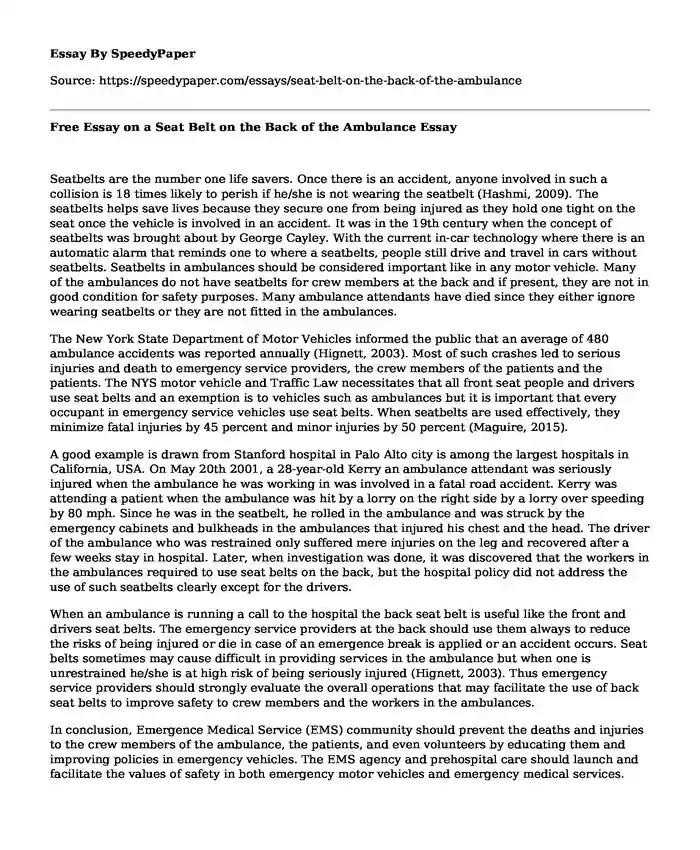
| Type of paper: | Essay |
| Categories: | Health and Social Care |
| Pages: | 3 |
| Wordcount: | 639 words |
Seatbelts are the number one life savers. Once there is an accident, anyone involved in such a collision is 18 times likely to perish if he/she is not wearing the seatbelt (Hashmi, 2009). The seatbelts helps save lives because they secure one from being injured as they hold one tight on the seat once the vehicle is involved in an accident. It was in the 19th century when the concept of seatbelts was brought about by George Cayley. With the current in-car technology where there is an automatic alarm that reminds one to where a seatbelts, people still drive and travel in cars without seatbelts. Seatbelts in ambulances should be considered important like in any motor vehicle. Many of the ambulances do not have seatbelts for crew members at the back and if present, they are not in good condition for safety purposes. Many ambulance attendants have died since they either ignore wearing seatbelts or they are not fitted in the ambulances.
The New York State Department of Motor Vehicles informed the public that an average of 480 ambulance accidents was reported annually (Hignett, 2003). Most of such crashes led to serious injuries and death to emergency service providers, the crew members of the patients and the patients. The NYS motor vehicle and Traffic Law necessitates that all front seat people and drivers use seat belts and an exemption is to vehicles such as ambulances but it is important that every occupant in emergency service vehicles use seat belts. When seatbelts are used effectively, they minimize fatal injuries by 45 percent and minor injuries by 50 percent (Maguire, 2015).
A good example is drawn from Stanford hospital in Palo Alto city is among the largest hospitals in California, USA. On May 20th 2001, a 28-year-old Kerry an ambulance attendant was seriously injured when the ambulance he was working in was involved in a fatal road accident. Kerry was attending a patient when the ambulance was hit by a lorry on the right side by a lorry over speeding by 80 mph. Since he was in the seatbelt, he rolled in the ambulance and was struck by the emergency cabinets and bulkheads in the ambulances that injured his chest and the head. The driver of the ambulance who was restrained only suffered mere injuries on the leg and recovered after a few weeks stay in hospital. Later, when investigation was done, it was discovered that the workers in the ambulances required to use seat belts on the back, but the hospital policy did not address the use of such seatbelts clearly except for the drivers.
When an ambulance is running a call to the hospital the back seat belt is useful like the front and drivers seat belts. The emergency service providers at the back should use them always to reduce the risks of being injured or die in case of an emergence break is applied or an accident occurs. Seat belts sometimes may cause difficult in providing services in the ambulance but when one is unrestrained he/she is at high risk of being seriously injured (Hignett, 2003). Thus emergency service providers should strongly evaluate the overall operations that may facilitate the use of back seat belts to improve safety to crew members and the workers in the ambulances.
In conclusion, Emergence Medical Service (EMS) community should prevent the deaths and injuries to the crew members of the ambulance, the patients, and even volunteers by educating them and improving policies in emergency vehicles. The EMS agency and prehospital care should launch and facilitate the values of safety in both emergency motor vehicles and emergency medical services.
References
Hashmi, N., Gaynor, M., Pepe, M., Welsh, M., Tollefsen, W. W., & Myung, D. W. (January 01, 2009). A Prehospital Database System for Emergency Medical Services.
Hignett, S. (2003). Evidence-based patient handling: Tasks, equipment, and interventions. London: Routledge.
Maguire, B. J. (January 01, 2015). Ambulance safety. 222-230.
Cite this page
Free Essay on a Seat Belt on the Back of the Ambulance. (2019, Sep 03). Retrieved from https://speedypaper.net/essays/seat-belt-on-the-back-of-the-ambulance
Request Removal
If you are the original author of this essay and no longer wish to have it published on the SpeedyPaper website, please click below to request its removal:
- Essay Sample with a Letter of Application
- Free Essay: Commercial Nuclear Energy in the United States
- Free Essay Sample: Apple's Patents War Versus Samsung
- Rhetoric Analysis Essay Example on the Book "Childhood Obesity"
- Affordable Housing for Students with Special Needs, Free Essay
- Proposal for the Foster Care System, Essay Example
- Legislative History of Healthcare for Illegal Foreigners - Paper Example
Popular categories




